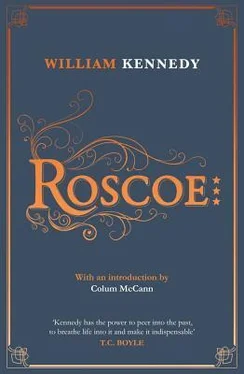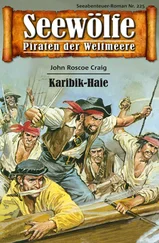The audience applauded his remark and Roscoe ran down from the balcony to ask Elisha: What question is being asked? Why the spheres? But the theater was now dark, and the audience, dancers, and Elisha were gone.
Love, Scandal, and Horses
When you are three, as in that 1921 photo on the wall of Roscoe’s hotel room, and one of the three is subtracted, the sum is less than you’d expect; for the mathematics of the spirit are complex. Now, at Elisha’s wake, they were two, Roscoe and Patsy, both feeling like leftovers after the banquet. Patsy, in politics since he was old enough to deface Republican ballots, was at his first wake since his brother Matt died (Patsy did not like the dead), looking bumptious, the only way he knew how to look, even in his new blue suit. Roscoe had combed and gracefully parted his beard, draped his corpulence stylishly in a white Palm Beach suit, and stood somberly dapper by the bier with white shoes, black pocket handkerchief, black tie.
The wake sprawled over the vast, pampered lawn of Tivoli, with its upper and lower mansions, its sculpted gardens, surrounding woods. Servants’ quarters stood behind the upper mansion, and beyond that the barns, stables, and racetrack that Lyman had built in the 1870s for his trotters, and which Ariel, and later Elisha, modified for their Thoroughbreds. It was a day full of sun and small breezes, and under a broad white canopy, Roscoe, Patsy, and O.B., a late arrival, stood watch alongside Elisha, the enigma in the open coffin, who looked great dead, in his gray linen suit and white tie, his head wound cosmetically banished.
“What do you know that I don’t?” Patsy asked when Roscoe arrived at his side.
“Alex is on the way home. He was already a day out on the troopship when he got the news. Bart or Joey will pick him up when he docks.”
“I’m talking about Eli’s autopsy.”
“Mac’s bringing that over.”
“He’s on the way,” O.B. said, looking authoritative in his police chief’s uniform, buttons polished and gleaming in the sunlight. “We did two autopsies, one real, one fake.”
“But we don’t know why he did it,” said Patsy.
“We will,” Roscoe said. “He can’t just kill himself like this and get away with it.”
“He took a hell of a lot with him,” Patsy said. “We’ll need six guys to take his place.”
“Six is nowhere near enough,” Roscoe said.
Elisha’s coffin lay on a pedestal beneath the canopy, halfway between the gatehouse and Veronica’s swimming pool. Shiny green smilax leaves covered the bottom half of the coffin, which was ringed with orchids from the Fitzgibbon hothouses. On the lawn’s very long slope perhaps a thousand floral arrangements, far more than anyone could ever recall seeing in one place, lay as a crescent-shaped blanket of regret that Elisha had gone away.
He had five official mourners: Veronica, and their twelve-year-old adopted son, Gilby, who looked sticklike and bored in black linen suit and black tie, his hair brushed flat, his acne getting serious; Elisha’s two sisters, Emily and Antonia, and his brother, Gordon, the banker, who were already crowding Veronica for control of the mill. Roscoe, Patsy, and O.B. stood as unofficial mourners at the head of the coffin, close to Veronica but away from contact with the endless line of wakegoers.
And here they came, into their third hour: wealthy lawyers, doctors, bankers, and businessmen, the financial peerage with whom Elisha had lunched almost daily at the Fort Orange Club; also the blue-book women, lady golfers, legislative wives, garden-club matrons whom he courted socially and won politically; several Catholic priests and rabbis, and all the Episcopal clerics in town; countless steelworkers and secretaries from the Fitzgibbon mill; and all three rings and sideshow of the Democratic circus: pomaded ward leaders, aldermen and committeemen, underpaid undersheriffs, jailers, lawyers and clerks, bloated contractors, philanthropic slumlords, nervous bookmakers unaccustomed to sunlight.
Happy McGraw, no known occupation, ever, edged out of line to shake hands with the rumpled boss who ran the town: Hello, Patsy, how’s yourself, what a loss, Pat, you and Eli were friends a long time, he was such a good fellow, keep well, Pat, you’re looking grand, can you spare five? And Patsy: Not here, Hap, button your pants before they fall off and see me Sunday after mass, not saying which mass or which church, he’ll find me. Ah, God love ya, Pat, Hap said, fading away with a smile.
Ex-Governor Herbert Lehman, who fought Elisha for the gubernatorial nomination in ’32, held Veronica’s hand, and Walter Foley, ex-editor of the Times-Union, the first paper to support Patsy’s run for assessor in 1919, kissed her on the cheek, as did Marcus Gorman. Patsy’s brother was in line, Benjamin (Bindy) McCall, who’d gained a hundred and fifty pounds in the six years since the Thorpe brothers hired Lorenzo Scarpelli to kill him; and, behind Bindy, Joe Colfels, who, because he went to school with Elisha, was now a Supreme Court judge; and Moishe (Mush) Trainor, who made seven million running beer with Patsy in Prohibition and blew it gambling; and Deputy Mayor Karl Weingarten, who took over as mayor when Alex joined the army. They’d all come for a last look at the dead leader who had helped create their politics, their livelihood, their city, came also to prove publicly their personal loyalty to the leaders who weren’t dead, Roscoe and Patsy.
The harmony of the Episcopal boys’ choir signaled the advent of the ceremonial moment, and the end of personal contact with the mourners, though two hundred were still in line. Seventy incumbent state senators and assemblymen walked toward the coffin, paying collegial homage to the erstwhile Lieutenant Governor, who had presided over the New York State Senate during the 1933–34 sessions.
Roscoe moved to Veronica’s side before the legislators reached the canopy. He could not resist the urge to touch her, for she was solemnly but irresistibly seductive in her elegant black chiffon mourning gown and strand of pearls, a gift from Elisha. Her eyes, without tears, were brilliant with rapt obligation to public grief.
“How are you holding up?” He touched her shoulder.
“I’m a zombie,” she said.
Most beautiful zombie Roscoe ever saw. “How are you doing, Gilby?” Gilby was staring at Elisha in his coffin.
“He didn’t say goodbye, Roscoe.”
“That’s true. He went very suddenly But we’re saying goodbye now.”
“Everybody should say goodbye to him.”
“You’re right. And everybody is here.”
“Not everybody,” Gilby said, and he looked at his mother.
“Who’s missing?” Roscoe asked. But Gilby was running across the lawn toward the stables.
“You gave him permission to get the dogs,” Veronica said. “He wanted them here but I said no. We put them in the tack room.”
Roscoe saw Gilby open the stable door as the dean of the Episcopal Cathedral began reading the funeral service, the lesson from St. John: “Jesus saith, let not your heart be troubled,” which is easy to say. And then followed a hymn of comfort, “The Strife Is O’er; the Battle Done,” a wrong message, for the battle hadn’t even begun. How can you do battle if you don’t know the point of the war, or who the enemy is?
Roscoe broke away from the hymn singing when he saw Mac crossing the lawn, and went to meet him. They went to the far end of the east portico, where no one could eavesdrop. Mac, full name Jeremiah McEvoy, wearing a blue-and-white seersucker suit, blue tie, and coconut straw hat with a blue-and-white band, ficey little well-dressed cop, handed Roscoe two autopsy reports, one for publication on Elisha, dead of coronary occlusion; and one on Abner Sprule, an alias the Party used instead of John Doe when it suited them. Chloral hydrate killed Sprule, enough to put away two people.
Читать дальше












